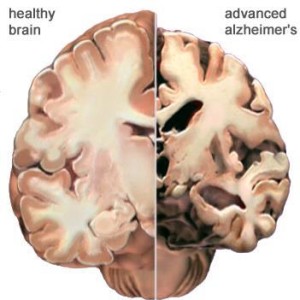 Tau proteins are important to a properly functioning nervous system. They interact with tubulin (a spherical protein, which is the building block of microtubules and important to the cell’s structure). When functioning properly, tau proteins interact with tubulin and strengthen the neural tubes in the axon (a process that extends from the neuron, or nerve cell, to carry a signal). The neural tubes are like highways that allow the nervous signal to travel down the axon.
Tau proteins are important to a properly functioning nervous system. They interact with tubulin (a spherical protein, which is the building block of microtubules and important to the cell’s structure). When functioning properly, tau proteins interact with tubulin and strengthen the neural tubes in the axon (a process that extends from the neuron, or nerve cell, to carry a signal). The neural tubes are like highways that allow the nervous signal to travel down the axon.
There are neurodegenerative diseases, like Alzheimer’s disease, that are known a tauopathies. This means that there has been disruption in the tau protein, creating instability in the neural tubes. This disrupts the signals in the central nervous system, leading to symptoms like dementia.
A tau protein is a protein found in neurons, primarily in the central nervous system. Several different versions or isoforms of tau protein can be found in the body, and all are critical to the healthy functioning of a normal nervous system. These proteins were first identified in the 1970s, and research on tau protein is continuing in many areas of the world, as researchers are curious about the role of these proteins in healthy individuals and in certain diseases which involve the central nervous system.
Previous studies have shown that grape seed extract (specifically, polyphenols derived from the grape seed) protect the tau proteins, and may help protect against neurodegenerative diseases like Alzheimer’s disease. In an in-vitro (taking place outside of the body) study, appearing in the Journal of Alzheimer’s Disease (2009;16(2):433–439), researchers found that grape seed polyphenolic extract (GPSE), prevented disruption of tau proteins. Other research, appearing in the Journal of Biological Chemistry (November 21, 2008. 238(47): 32176–32187), supports this finding. GPSE was able to interfere with disruption of tau proteins in mice in a study that appeared in the Journal of Neuroscience (June 18, 2008. 28(25);6388–6392). Researchers were also able to prevent cognitive decline and a Alzheimer’s-like pathology (called cerebral amyloid deposition) in mice with the use of GPSE.






